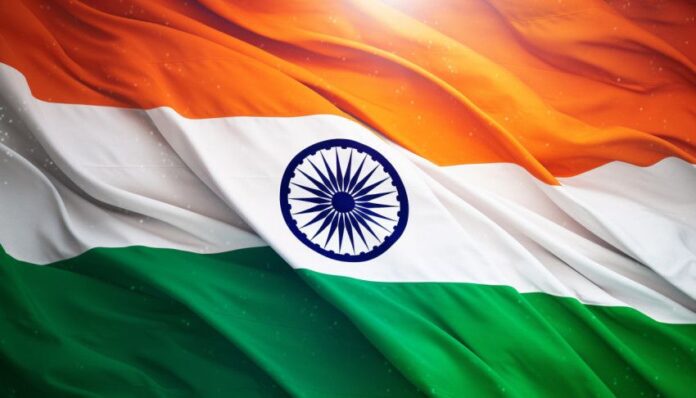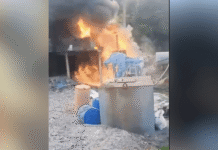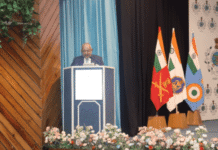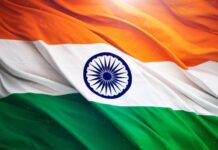The 79th Independence Day was celebrated with patriotic fervour across the Nicobar District, where official functions, cultural displays, and award ceremonies came together to mark the occasion. The central event was held at the BJR Stadium in Car Nicobar on August 15, drawing a wide cross-section of the community, from senior officers of the administration and security services to school children and local residents.
The celebrations began with the hoisting of the national flag by Amit Kale, Deputy Commissioner of Nicobar District, followed by the rendition of the national anthem. The stadium resonated with patriotic energy as the tricolour fluttered against the morning sky, symbolising both India’s freedom and the shared aspirations of the island’s people. Rahul Nair, Superintendent of Police, Nicobar, was present as guest of honour, alongside representatives of the Air Force, tribal leaders, and public officials, underscoring the significance of the event for the entire district.
In his Independence Day address, the Deputy Commissioner acknowledged the resilience of the Nicobarese community in the face of challenges, highlighting their ability to stand united through natural calamities and socio-economic hurdles. He emphasised that Independence Day was not merely a commemoration of the nation’s freedom struggle but also a reminder of the responsibilities citizens hold in building a stronger and more inclusive country. The administration, he said, remained focused on sustainable development, improved connectivity, and welfare programmes designed specifically for the tribal communities of the Nicobar Islands.
The message carried particular weight in a district where geographical isolation has often limited access to infrastructure and services. Kale’s speech highlighted initiatives being undertaken to overcome these barriers, stressing the importance of connectivity through better transport and communication systems. Development, he noted, would only be meaningful if it remained inclusive, respectful of tribal heritage, and aligned with environmental sustainability.
The programme at BJR Stadium extended beyond formal proceedings, featuring a diverse cultural showcase. Traditional Nicobarese dances, performed by local troupes, brought colour and rhythm to the celebrations, preserving the unique heritage of the islands while sharing it with younger generations. Patriotic songs by schoolchildren further amplified the spirit of the day, combining national pride with youthful enthusiasm. Performances by various schools underscored the role of education in sustaining both cultural values and civic responsibility.
An award ceremony followed, recognising the contributions of government officials, frontline workers, and students. Commendation certificates were distributed to those who had displayed exemplary service in their respective fields, ranging from administrative efficiency and public health efforts to academic and extracurricular achievements. This acknowledgment not only rewarded individual dedication but also encouraged collective participation in district progress.
The presence of tribal leaders at the ceremony reflected the integration of traditional authority and modern governance in the islands. Their involvement in the event symbolised cooperation between the administration and local communities, a partnership that has historically shaped Nicobar’s identity. The blending of cultural performances with official functions demonstrated the way in which national celebrations in the islands retain both Indian and Nicobarese character, reinforcing unity without diminishing diversity.
For the general public, the Independence Day function provided a rare opportunity to gather in large numbers, share in the pride of being part of the nation, and reaffirm community bonds. The stadium’s atmosphere reflected harmony and inclusiveness, with people from different walks of life participating side by side. Schoolchildren, in particular, formed a lively part of the gathering, representing the future generation for whom such celebrations provide both education and inspiration.
Beyond Car Nicobar, Independence Day was observed across the district in smaller gatherings at village and panchayat levels. Local programmes included flag hoisting, cultural activities, and community games, enabling participation even in remote areas. These decentralised celebrations illustrated how the spirit of the day reached every corner of the district, reinforcing both national identity and local solidarity.
The 79th Independence Day came at a time when the islands continue to balance development goals with environmental and cultural preservation. The Deputy Commissioner’s emphasis on sustainability reflected awareness of the unique challenges posed by climate change and ecological fragility in the Nicobar region. The administration’s stated focus on welfare schemes for tribal communities also resonated with the ongoing need to preserve cultural identity while ensuring equitable growth.
In the broader context, the celebrations at Nicobar echoed the nationwide mood of patriotism and reflection. While urban centres on the mainland marked Independence Day with large-scale parades and technological showcases, the Car Nicobar function stood out for its integration of tradition, simplicity, and inclusiveness. It offered a reminder that freedom is not only about national strength but also about the ability of diverse communities to coexist and thrive together.
As the celebrations concluded, the unity and community spirit displayed at BJR Stadium left a strong impression of resilience and hope. From the stirring cultural performances to the recognition of service and achievement, the day highlighted both continuity and progress. For Nicobar, the event reaffirmed its place in the national narrative, while also shining a spotlight on the local challenges and aspirations that continue to shape its journey.
The Independence Day of 2025 in Nicobar was not just an anniversary of freedom but also a reaffirmation of responsibility. In celebrating together, the people of the district renewed their commitment to building a future that honours heritage, embraces development, and strengthens the fabric of unity that defines both the islands and the nation as a whole.





